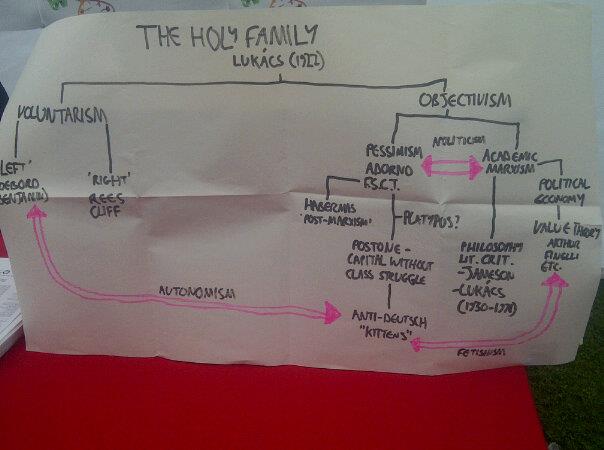Taking advantage of the January break in our primary reading group schedule, we will hold a discussion of the recent Hannah Arendt biopic by the German New Wave director Margarethe von Trotta.
Saturday, January 18 from 1-4 PM
School of the Art Institute of Chicago
112 S. Michigan Ave
Room 920
Readings for discussion of the film:
* priority readings
* Hannah Arendt (2013) film DVD insert
* Hannah Arendt, Prologue to The Human Condition (Vita Activa) (1958)
* Martin Heidegger, “Only a god can still save us,” interview with Der Spiegel (1966)
Walter Benjamin, “To the planetarium,” One-Way Street (1928)
Theodor W. Adorno, “Reflections on class theory” (1942)
* Alan Ryan, “Dangerous Liaisons,” book review of Elzbieta Ettinger, Arendt and Heidegger (1996)
* Michael A. Musmanno, “Man with an unspotted conscience,” original New York Times book review of Arendt’sEichmann in Jerusalem(1963)
* Norman Podhoretz, “The perversity of brilliance” (contra Arendt on Eichmann) (1963)
* Max Horkheimer, "On the capture of Eichmann"
Arendt, Eichmann in Jerusalem (1963)
A Platypus-wide teach-in on the CPGB’s campaign against Lukacs and its stakes for Platypus as a project.
Held on Saturday January 11 1-4PM at the School of the Art Institute of Chicago 112 S. Michigan Ave. room 920 while simultaneously broadcast internationally via Livestream.
James Turley's historical chart of Lukacs's influence on Platypus:

The preparatory readings for this event are as follows and can be found at:
- Mike Macnair, “The philosophy trap” 11/21/13
http://www.cpgb.org.uk/
- Chris Cutrone, “Defending Marxist Hegelianism against a Marxist critique” 8/11/11
http://www.cpgb.org.uk/
- Georg Lukacs, Original Preface (1922) to History and Class Consciousness (1923)
http://www.marxists.org/
CPGB contra Lukács
Communist Party of Great Britain (Provisional Central Committee)
contra Georg Lukács
James Turley, Chris Cutrone, Lawrence Parker
http://
Originally published in Weekly Worker January 24 – March 14, 2013. PDF:
http://
articles:
- James Turley, “The antinomies of Georg Lukács” 1/24/13
- Chris Cutrone, “Regression” 1/31/13
- James Turley, “Dummy” 2/21/13
- Chris Cutrone, “Nota bene” 2/28/13
- James Turley, “Bacon” 3/7/13
- Lawrence Parker, “Lukács reloaded” 3/7/13
- Chris Cutrone, “Unreloaded” 3/14/13
http://
Supplemental:
Chris Cutrone, “Gillian Rose’s ‘Hegelian’ critique of Marxism” 3/1/10
http://platypus1917.org/
A panel event held on November 5th, 2013, at the School of the Art Institute of Chicago.
It is generally assumed that Marxists and other Leftists have the political responsibility to support reforms for the improvement of the welfare of workers. Yet, leading figures from the Marxist tradition-- such as Lenin, Luxemburg, and Trotsky-- also understood that such reforms would broaden the crisis of capitalism and potentially intensify contradictions that could adversely impact the immediate conditions of the workers. For instance, full employment, while being a natural demand from the standpoint of all workers' interests, also threatens the conditions of capitalist production [which rely on a surplus of available labor], thereby potentially jeopardizing the system of employment altogether. In light of such apparent paradoxes, this panel seeks to investigate the politics of work from Leftist perspectives. It will attempt to provoke reflection on and discussion of the ambiguities and dilemmas of the politics of work by including speakers from divergent perspectives, some of whom seek after the immediate abolition of labor and others of whom seek to increase the availability of employment opportunities. It is hoped that this conversation will deepen the understanding of contemporary problems faced by the Left in its struggles to construct a politics adequate to the self-emancipation of the working class.
Speakers:
Bill Barclay
Democratic Socialists of America/Chicago Political Economy Group
Lenny Brody
Justice Party/Network for Revolutionary Change
Leon Fink
Professor of labor history, University of Illinois at Chicago
1st Floor Leroy Neiman Center (Sharp Building)
Description:
It is generally assumed that Marxists and other Leftists have the political responsibility to support reforms for the improvement of the welfare of workers. Yet, leading figures from the Marxist tradition-- such as Lenin, Luxemburg, and Trotsky-- also understood that such reforms would broaden the crisis of capitalism and potentially intensify contradictions that could adversely impact the immediate conditions of the workers. For instance, full employment, while being a natural demand from the standpoint of all workers' interests, also threatens the conditions of capitalist production [which rely on a surplus of available labor], thereby potentially jeopardizing the system of employment altogether. In light of such apparent paradoxes, this panel seeks to investigate the politics of work from Leftist perspectives. It will attempt to provoke reflection on and discussion of the ambiguities and dilemmas of the politics of work by including speakers from divergent perspectives, some of whom seek after the immediate abolition of labor and others of whom seek to increase the availability of employment opportunities. It is hoped that this conversation will deepen the understanding of contemporary problems faced by the Left in its struggles to construct a politics adequate to the self-emancipation of the working class.
Speakers:
Bill Barclay
DSA/Chicago Political Economy Group
Lenny Brody
Justice Party/Network for Revolutionary Change
Leon Fink
labor history, UIC

